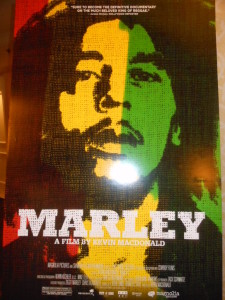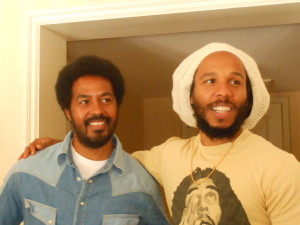There have been many projects done about the late, great Bob Marley, but “Marley” is the first to be not only officially sanctioned by his family, but to involve their major participation, both on and off screen. Ziggy Marley, the reggae star’s oldest son, is an executive producer, along with Island Records founder Chris Blackwell.
There’s another first for this nearly two-and-a-half hour long documentary, directed by Oscar winner Kevin Macdonald (“One Day in September,” “The Last King of Scotland,” “State ofPlay”). Because it’s being released on April 20 by Magnolia Pictures, whose parent company owns Landmark Theaters, the film will also be available onVOD and, get this, on Facebook for rental at $6.99. Normally, theater chains would go ape about the other distribution venues providing the movie on the same day and date, but this remains all in the (Mark Cuban) family.
However, we still recommend seeing it on the big screen, where you’ll have an up front seat at the thrilling performances of Bob Marley and the Wailers on stages from London and Zimbabwe to Kingston and New York as they rose to worldwide acclaim in the early 1970s, and continuing until their reggae reign was cut short in 1981 by Marley’s untimely death of melanoma at the age of 36.
But “Marley” encompasses much more than music. The film is a revelatory examination of Marley’s entire life – from the rejection and ridicule he suffered for being mixed-race to the assassination attempt that also landed a bullet in his wife’s head just days before a politically charged concert in Jamaica and the disease that felled him– and why decades later, he is still idolized by people around the world and sells millions of records–50 million worldwide since 1992 alone.
And speaking of records, the soundtrack of the film, a two-disc set, was just released, and includes 24 cuts chosen by the Marley family and Island Records founder Chris Blackwell. The collection includes live and studio versions of Marley’s classics like “No Woman, No Cry,” “Could You Be Loved,” “I Shot the Sheriff,” “Get Up Stand Up,” “Stir It up” and “One Love.”
There’s such a timeless quality to the music that politically-inspired movements such as Occupy Wall Street and the Arab Spring uprisings have used some of the songs as anthems– not to mention that the universally beloved messages of peace and love that go out of style.
The documentary gives you a comprehensive look at Marley’s beginnings in a dirt-poor rural area of Jamaica, before he moved with his mother to Trench Town, a shantytown district of Kingston, where Marley made many of the connections that would stay with him through his lifetime.
The film reveals the rejection and ridicule he suffered for being of mixed race. His mother, who was interviewed in the film, is black, while his father was a white Englishman who had a short relationship with her. There is apparently only one known photograph of the man, Norval Marley, and he’s on horseback.
Director Macdonald says that in making the film he wanted to find out why Bob Marley still speaks to people around the world so much more profoundly than any other rock star or popular musical artist.
“What I was fascinated to try to do in this film was to make something very personal,” he says. “Who is this man? Why did he become so successful? What was his message that he had to give out people?”
The result is a definitive life story of the musician, the revolutionary, and the legend, told with rare or unseen footage and revealing interviews with family members and others who knew Bob Marley well, including one of his school teachers who talks about his early musical talent. In fact, Marley released his first record at the tender age of 16.
The documentary delivers a depth of insight that would have been impossible without the cooperation of the Marley family, including Bob’s wife, Rita and their children, including Ziggy and his sister Cedella, several of his girlfriends, friends and musical colleagues who opened up on camera about his life and times.
One of the biggest challenges was the lack of archival footage from early years. Macdonald says that from 1962 until 1973– when Bob Marley first attained worldwide recognition– there’s not a single piece of footage and only a handful of photographs.
The Wailers, the group Bob formed with the late Peter Tosh and Neville “Bunny” Livingston– who is extensively interviewed and also served as associate producer of the documentary – once had five of the top 10 singles on Jamaican charts early in their career. But despite their prominence, the infrastructure necessary to document their career was sadly lacking at the time.
“It just shows a lot about what Jamaica was like then,” says Macdonald.
For Ziggy, looking at the footage provided new insights into his father’s life. He was just shy of 13 years old when Bob Marley died of melanoma inMiami.
“I learned a lot about his early life in Trench Town and the hard time he suffered as a result of his skin color,” says Marley. “I never knew anything about his time in Germany, where he went for treatment of his melanoma, so that was very emotional and insightful. I learned a lot about his illness that I didn’t know.”
Ziggy says that like some of his brothers and sisters still do, he used to call Bob Marley “daddy.”
“He’s like a brother, father, teacher and uncle to me now,” Marley says. “I feel enough closeness to his life and emotional feelings that will always be part of me. We have a relationship that continues to evolve and grow. When I was younger, I wanted to be just like him. I used to try, now I don’t try, but I feel his spirit within me.”
That spirit comes through loudly and clearly through the documentary and brings a new appreciation and respect for one of the greatest musical artists of our time whose legacy continues to inspire people around the world.




